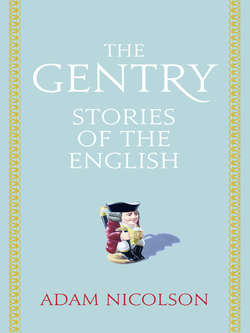Читать книгу The Gentry: Stories of the English - Adam Nicolson - Страница 16
1610s–1650s
ОглавлениеSteadiness
The Oglanders
Nunwell, Isle of Wight
Sir John Oglander was in love with his own life: with his vision of the past and his long line of ancestors stretching back into it; with his own role as the guardian of his family’s wellbeing in the troubled seventeenth century and on into ‘futor Adges’; and with Nunwell, the Oglander house and lands at the eastern end of the Isle of Wight, the matrix of his being, to whose health and happiness he dedicated year after year.
His deep attachment to Nunwell and the Isle of Wight is intriguing because although he was born here in 1585, the family left in 1588, after his mother had been frightened by the sight of the Spanish Armada sailing up the Channel.1 They kept the property but went to live on the mainland, settling on land they owned in Sussex. Only in 1609, when his father died and John was twenty-four, did he return to the Isle of Wight. This late return to a place John Oglander thought of as home may be at the root of his passionate attachment to Nunwell.
He is more knowable than anyone in these stories, largely because of his extraordinary notebooks, his ‘Bookes of Accoumpts’, the surviving leather-bound volumes written between 1620 and 1648, which have been treasured by the Oglander family ever since.2
At heart they are no more than a steady calculation, quarter by quarter, of what he spent and what he owed, what he lent and what was owed to him, what income he could expect and what, in total, he was worth. But he was too active and too curious to stick merely to figures and over the years the notebooks gradually filled with all the multifarious contents of his mind. The result was a real-time depiction of a man’s life and priorities, a portrait of a member of the seventeenth-century gentry alive in that moment, jumping from one subject to another, from one pre-occupation to the next, from memories to plans, regrets to delights, enemies to friends, events to principles.
